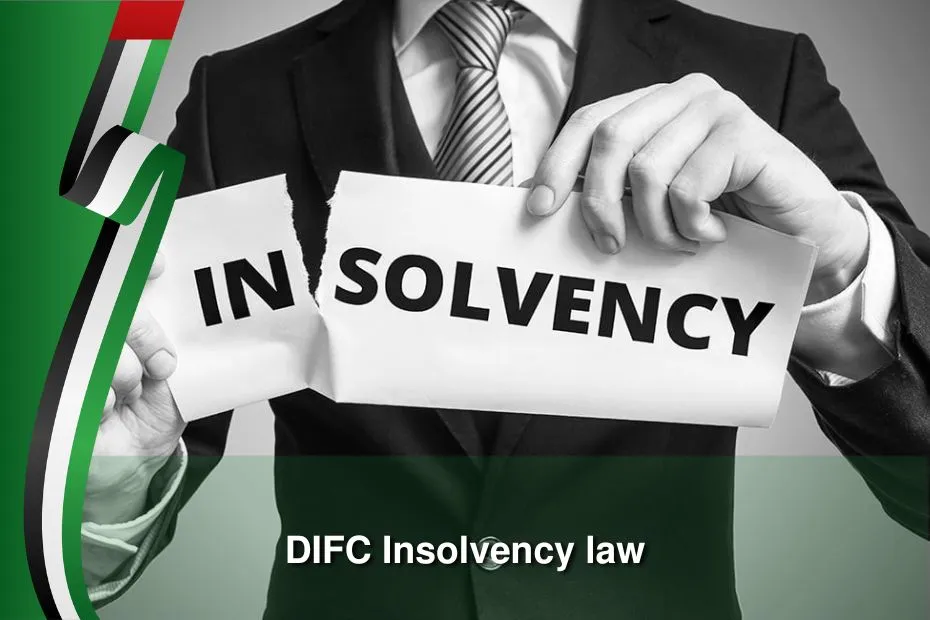The Dubai International Financial Centre has a unique legal framework governing various financial and commercial activities. One crucial component of this framework is the DIFC Insolvency Law.
This article briefly summarizes its significant aspects for businesses and individuals and introduces the related legal services for 2024.
Contact Al Mulla Law Firm in UAE. Click the WhatsApp icon below or go to the Contact Us page. Locations: Dubai, Abu Dhabi and Ras Al Khaimah.
Table of Contents
DIFC Insolvency Law Key Points and Rules
DIFC Law No. 1 of 2019 is a cornerstone regulation that shapes the insolvency landscape in the DIFC. Here are the essential points:
- Enactment Date and Commencement Date: This law was enacted on June 13, 2019, and came into force on August 28, 2019.
- Insolvency Regulations 2019: Follow these regulations for procedural guidelines during insolvency. For instance, if your company is undergoing insolvency, you must ensure that your appointed insolvency practitioner is registered with the DIFC and meets the specified qualifications.
- Insolvency Insurers Regulations 2008 and Preferential Creditor Regulations 2008: Prioritize employee payments, with wages up to AED 200,000 being paid before other creditors. For example, if your company has 50 employees and owes them wages, you must pay them up to AED 200,000 each before settling debts with suppliers.
- DIFC Law Amendment Law No. 3 of 2024 and DIFC Laws Amendment Law No. 2 of 2022: Stay updated with these amendments to improve and streamline your insolvency processes. For instance, the 2024 amendment introduced a simplified process for small businesses to file for insolvency, which could be beneficial if your business falls into this category.
- Enactment Notices: Track official notifications regarding implementing various legal provisions to ensure compliance. For example, if a new enactment notice about changes in reporting requirements is issued, your company must adjust its processes accordingly.
- Employee Wage Priority: Ensure employee wages up to AED 200,000 are prioritized in insolvency proceedings. For example, if your business becomes insolvent, you must use available funds to pay employees their outstanding wages up to the specified amount before paying other creditors.
- Moratorium on Legal Actions: Utilize the moratorium on legal actions to reorganize your business without external pressures. For instance, if your company is granted a moratorium, creditors cannot pursue legal actions against you, giving you time to restructure your debts.
- Voidable Transactions: Avoid transactions that could be deemed fraudulent, especially those made within a specific period before insolvency. For example, if you transferred significant company assets to another business owned by a family member shortly before declaring insolvency, this transaction could be voided.
- Insolvency Practitioners’ Duties: Appoint qualified insolvency practitioners who act in the best interest of creditors and provide regular reports. For example, your appointed practitioner should provide monthly updates to creditors detailing the progress of the insolvency proceedings.
- Reorganization Plans: Develop comprehensive reorganization plans that can be approved by most creditors. For instance, if your business proposes a plan to continue operations while gradually repaying debts, you need approval from more than 50% of your creditors by value.
- Cross-Border Insolvency Provisions: Cooperate with foreign insolvency proceedings to manage assets and liabilities across jurisdictions. For example, if your business has assets in both the DIFC and another country, you must coordinate with insolvency proceedings in that country to ensure all creditors are treated fairly.
For more details, refer to the official updated DIFC insolvency law pdf or schedule a consultation with Al Mulla Lawyers.
Legal Services Related to Insolvency in DIFC
Al Mulla DIFC Registered Lawyers’ extensive expertise in Insolvency Law ensures clients receive top-notch guidance and support. Here are their primary services:
- Consultation and Advisory: Offering expert advice on navigating the DIFC Insolvency Law.
- Representation: Legal representation in insolvency proceedings.
- Compliance Assistance: Helping businesses comply with Insolvency Regulations 2019 and related laws.
- Documentation and Filing: Ensuring accurate documentation and timely filing of necessary legal paperwork.
- Dispute Resolution: Mediating disputes between creditors and debtors to reach amicable solutions.
- Restructuring legal Assistance: Assisting clients in restructuring their business following the amendments introduced by DIFC Law Amendment Law No. 3 of 2024.
FAQs about DIFC Law of Insolvency
Conclusion
Understanding the DIFC Insolvency Law is crucial for businesses operating within the DIFC. With the enactment of DIFC Law No. 1 of 2019 and subsequent amendments, the legal framework has evolved to address contemporary challenges in insolvency proceedings.
For businesses seeking expert legal guidance, Al Mulla Lawyers provide comprehensive services, ensuring compliance and effective management of insolvency cases.
Contact Al Mulla Lawyers today! Click the Whatsapp icon below or visit our Contact Us page.
Find us at these locations:
– Dubai: Deira, Port Saeed, Street 8, City Avenue Building, Office 705-708.
– Abu Dhabi: Corniche Street, Golden Tower, Office 22.
– Ras Al Khaimah: Al Nakheel, Al Maamoura Building (Emirates NBD Bank Building), Fourth Floor.
Omar Al Mansoori is an Emirati legal advisor and researcher with over 10 years of experience in civil, commercial, and corporate law in the UAE. He focuses on simplifying complex legal topics and ensuring that every article published aligns with the latest national legislation and official regulations.
